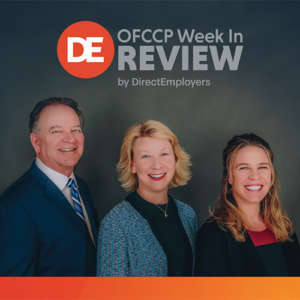 The DE OFCCP Week in Review (WIR) is a simple, fast and direct summary of relevant happenings in the OFCCP regulatory environment, authored by experts John C. Fox, Candee Chambers and Jennifer Polcer. In today’s edition, they discuss:
The DE OFCCP Week in Review (WIR) is a simple, fast and direct summary of relevant happenings in the OFCCP regulatory environment, authored by experts John C. Fox, Candee Chambers and Jennifer Polcer. In today’s edition, they discuss:
- OFCCP Presents the Past, Present, and Future during its Policy Update Webinar
- OFCCP Ombuds Tells What Types of Issues He is Handling
- The Women’s Bureau Requests Comments on Paid Leave
- “Quality and Utility” of Component 2 Compensation Data to Come
- What Would You Like to See Changed in the FMLA Regulations?
- Are You IN? to Celebrate the ADA’s 30th Anniversary
- Honoring the Americans with Disabilities Act – 30th Anniversary!
Wednesday, July 15, 2020: OFCCP Presents the Past, Present, and Future during its Policy Update Webinar
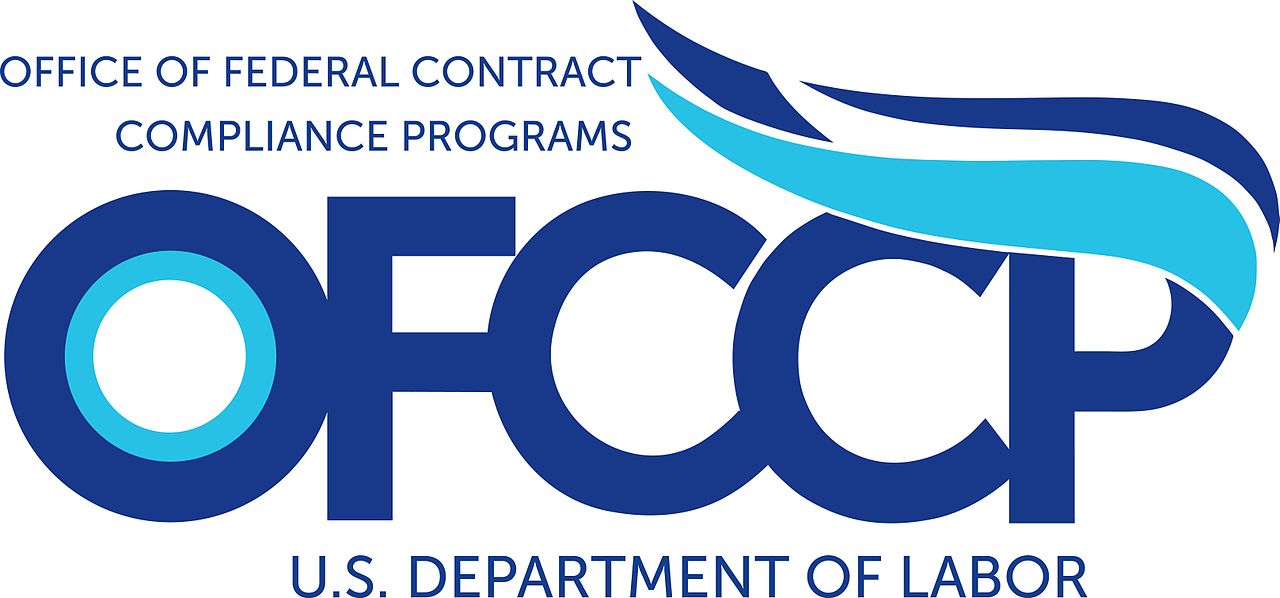
When you think of policy and program development, you don’t often think of laughter, collaboration, and transparency, but when Tina takes the microphone, you can feel her passion for what she does and her genuine sincerity to help federal Government Contractors succeed in reaching their compliance obligations and goals. Chris Seely didn’t miss a beat, provided good oversight in several areas and it’s quite clear these two work very well together.
Here is the breakdown of the topics covered.
There will be no extension to the COVID exemption.
Rulemaking
The Present
- TRICARE Final Rule: Effective Date: August 31, 2020
The Future
- Religious Exemption: Developing Final Rule
- Resolution Procedures (“PDN Rules”): Developing Final Rule
Focused Reviews
The Past
- The first Corporate Scheduling Announcement List (CSAL) to include Section 503 Focused Reviews (500) was posted in March 2019
- Since the inception of the 2014 regulations, 98% of those audited were not at the 7% Utilization Goal for Individuals with Disabilities (IWD)
The Present:
- 85% of the March 2019 Focused Reviews are complete
- There are only two technical violations to date
- The Virtual Reviews have been going very well
- Current audits show that 40-45% of Contractors are meeting or exceeding the 7% Utilization Goal for IWD
The Future
- There is an annual report to come, and it will include best practices and challenges identified by Contractors (i.e., people choosing not to self-identify)
The Past
- The first CSAL to include VEVRAA Focused Reviews (500) was posted in 2019
The Present
- The VEVRAA Scheduling Letters are ready to be mailed
The Future
- Expect more tools and resources to aid in audit preparation (similar to Section 503)
- Within the next 2-3 weeks, audit scheduling will begin
Accommodation Focused Reviews
The Present
- There will be two types of Accommodation Focused Reviews – Disability and Religious
- The website landing pages are in the works – expect to see them by the end of July
The Future
- The Religious Accommodation Focused Reviews will be first
- Tina did not speak to a time frame for the release of an Audit Scheduling Letter (only that Religious Reviews would be first)
Promotion Focused Reviews
The Present
- The website landing page is in the works – expect to see it by the end of July
- The Agency is working to define “what is a promotion?”
The Future
- Tina did not speak to a time frame for the release of an Audit Scheduling Letter (only that Religious Reviews would be first)
The end goal is one “Focused Review Landing Page” with links to get the specifics on the different types of Focused Reviews.
Directives
The Past/Present/Future
- DIR 2020-01 Spouses of Protected Veterans: Expect additional assistance to come on how to support military spouses
- DIR 2020-02 Efficiency in Compliance Evaluations: The Agency is getting aged cases down, now below 15%, possibly even 10%
- DIR 2020-03 Pre-Referral Mediation Program
- DIR 2020-04 Ombuds Service Supplement
Town Halls
The Past/Present
- 2019 Action Plan contains six deliverables, which are almost complete
The Future
- Virtual Town Halls are in the idea stage, but the events would be very interactive, and without the need to travel, more participants could attend. Tina’s goal is to launch the first virtual Town Hall before the end of the calendar year.
How does DirectEmployers support OFCCP’s Town Hall Action Plan? Learn how now!
Recognition Programs
The Past
- Excellence in Disability Inclusion Award 2019 winners: CVS Health & PepsiCo
The Present
- CVS Health and PepsiCo will participate in a “Year of Engagement” program to share their best practices and encourage other employers to adopt them.
The Future
- The Agency is considering new recognition programs for Functional Affirmative Action Programs (FAAPs)
Indian and Native American Employment Rights Program (INAERP)
INAERP focuses on support to federal contractors and their efforts to foster outreach and inclusion of Native Americans.
The Past
- A complete refresh of the INAERP landing page on the OFCCP website
The Present
- The INAERP landing page hosts best practices for creating an inclusive workforce on Native Americans, a comprehensive list of Native American resources, and Frequently Asked Questions on Indian Preference
The Future
- Expect more resources for both INAERP and Hispanic American Colleges and Universities (HACUs)
Construction
The Past
The Present
- The MEGA Construction Program: the Agency is looking for ways to reinvigorate these lucrative ($25 million or more) contracts lasting over one year. The goal is to increase women and minorities in these work opportunities.
The Future
- The next Construction Scheduling Audit List (CSAL) is yet to be determined. However, last week Director Leen answered “When is the next CSAL coming” question and said that Construction Contractors (Compliance Checks and possibly Compliance Reviews) could occur by the end of FY20 {i.e. within the next 2 1/2 months) or the beginning of FY21.
Technical Assistance Guidance (TAGs)
The Present
The Future
- Supply & Service TAG
- Small Contractor TAG
Contract Compliance Institute (CCI)
The Present
- There are a total of 2,882 registered users
- Current courses include: Path to Compliance & Affirmative Action Programs
The Future
- Two more courses coming: Supply and Service Compliance Reviews & Focused Reviews
- An OFCCP Learning Portal for OFCCP staff
- A training calendar to come for the next Fiscal Year
- The Agency is looking to hold live Q&A sessions for Contractors to chat with OFCCP
Wednesday, July 15, 2020: OFCCP Ombuds Tells What Types of Issues He is Handling

What is an Ombuds?
A confidential and neutral resource designated to provide conflict resolution and problem-solving services to members and/or stakeholders of an organization. At OFCCP, Marcus serves as a conflict resolution practitioner for OFCCP, Contractors, and Complainants.
How does it work?
Marcus follows the standards of practice from the International Ombudsman Association (IOA). These include:
- Marcus will ask, “What are you sharing with me that you do not want me to share with others?”
- Marcus is not an “advocate Ombuds” meaning he does not advocate for OFCCP or any other parties involved.
- Marcus is not part of any other division in OFCCP. He works independently.
- Marcus adopts practices on a case-by-case basis.
What types of Issues are Ombuds appropriate?
General issues between OFCCP, Contractors, and Complainants, such as:
- Concerns about a District Office’s handling of a Compliance Evaluation
- Discrepancies in the appropriate scope of a Compliance Review
- An impasse during Contractor and OFCCP conciliation discussions
- Complainant requests for status updates and measurable progress on complaint investigations
- Transparency issues identified during Compliance Evaluations and complaint investigation processes
General concerns/issues about OFCCP policies, procedures, and/or personnel, such as:
- Inconsistencies in the management of issues from one District Office to the next
- Unclear guidelines that prohibit Contractors from sufficiently complying
- Lack of oversight in certain OFCCP offices
- Lengthy Compliance Evaluations and lack of communication during them
Marcus tracks the types of referrals he receives and looks for trends. He confidentially reports his observations to OFCCP Senior Leadership and is working on an Ombuds Service Annual Report.
How do you reach Marcus?
Contact the Ombuds Service by calling (202) 693-1174 or send an email to Stergio.Marcus@dol.gov.
Thursday, July 16, 2020: The Women’s Bureau Requests Comments on Paid Leave
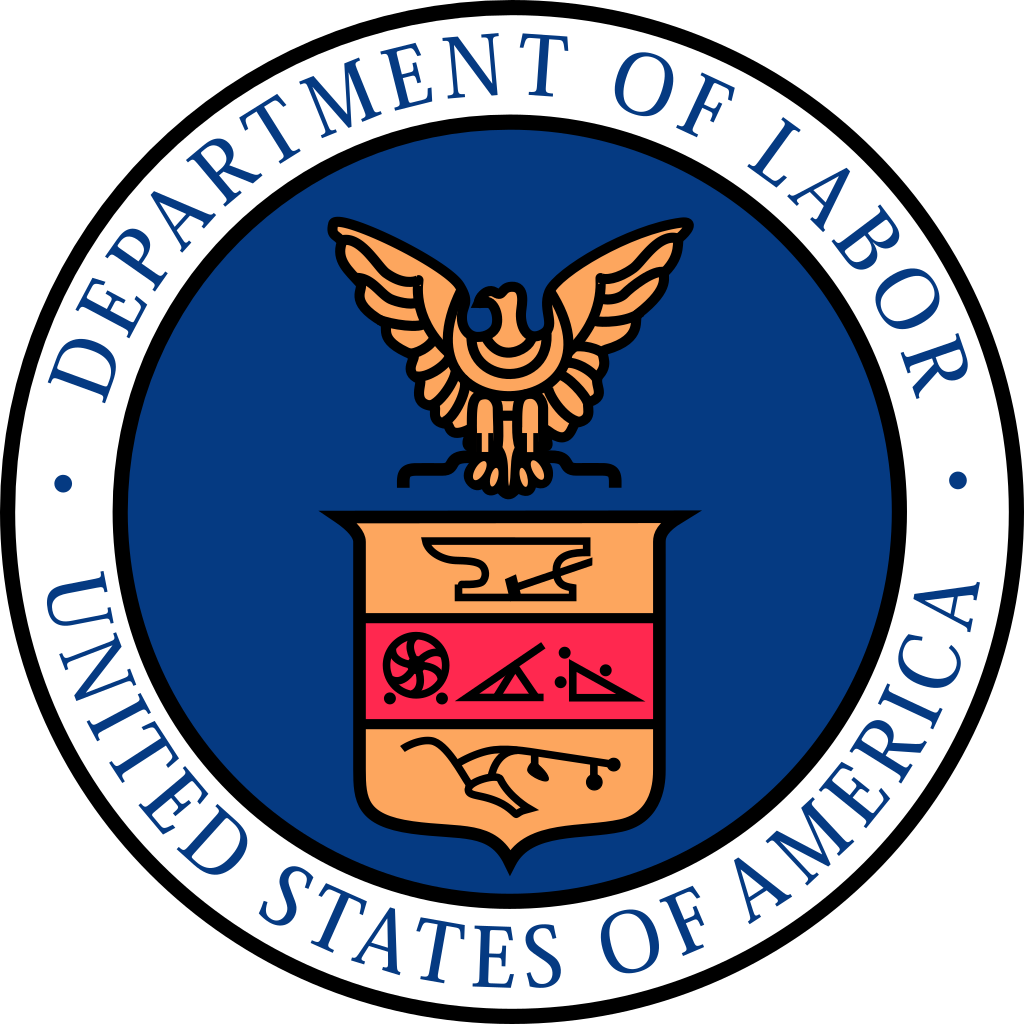
Who Should Comment?
- Employees
- Employers
- Researchers
- Other stakeholders
The Goal
The Department seeks to identify promising practices related to eligibility requirements, related costs, and administrative models of existing paid leave programs.
Previous Statistics
The background information in the RFI provides the following statistics, with footnotes:
- In 2019, a Bureau of Labor Statistics report found that 18% of U.S. private-sector workers had access to paid family leave through their employers.
- A 2011 Census Bureau report found that women using paid parental leave were twice as likely to return to work within three months, and most returned with similar hours and pay.
- A 2017 study by the Boston Consulting Group found that employer-provided paid family leave has grown most in private sector jobs that recruit highly skilled employees. Employees in the top income quartile were three and a half times more likely to have access to paid leave than employees in the bottom income quartile.
- According to the 2012 Department-commissioned report, 59% of all employees had access to unpaid leave through the Family and Medical Leave Act (FMLA).
For this Request, paid leave refers to paid family and medical leave to care for a family member or one’s own health.
Submit written comments on or before September 14, 2020.
Thursday, July 16, 2020: “Quality and Utility” of Component 2 Compensation Data to Come

The Information Quality Act
This 2000 Act requires federal Executive Branch agencies, including the EEOC, to assess and assure the quality and utility of data the agencies collect. To meet the Act’s requirements, CNSTAT‘s assessment will examine the fitness for use of the data, including the utility of pay bands to measure pay disparities and potential statistical and analytical appropriate uses of the data. The CNSTAT assessment will aid the EEOC’s approach to any future pay data collections.
“I am pleased that CNSTAT will be conducting a thorough review of the EEO-1 Component 2 data collection,” said EEOC Chair Janet Dhillon. “Not only will this independent assessment answer critical questions about the data that was collected, but will give the Commission valuable information as we consider the future of pay data collection.”
Note: This is not the first time CNSTAT has looked at the issue of pay data for the Commission. CNSTAT reviewed methods for measuring and collecting pay information and issued a final report, “Collecting Compensation Data from Employers,” in 2012.
The current CNSTAT project began on July 1, 2020 and the Committee expects to complete its work by Dec. 31, 2021.
Friday, July 17, 2020: What Would You Like to See Changed in the FMLA Regulations?
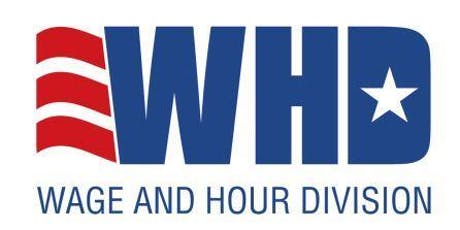
- What would employers like to see changed in the FMLA regulations to better effectuate the rights and obligations under the FMLA?
Challenges with the Definition of a “Serious Health Condition”
- What conditions or circumstances have employers encountered that meet the regulatory definition of a “serious health condition” but that they believe the statute does not cover?
- What difficulties have employers experienced to determine when an employee has a chronic condition that qualifies as a serious health condition under the regulations?
- What conditions or circumstances have employees experienced that they believe the statute covers, but which their employer determined did not meet the regulatory definition of “serious health condition”?
- What difficulties have employees experienced to establish that a chronic condition qualifies as a serious health condition under the regulations?
Challenges with Intermittent Leave
- What specific challenges do employers experience when the timing or need for intermittent leave is unforeseeable?
- What challenges do employees seeking or taking intermittent leave or using a reduced leave schedule experience?
- What are the best practices and suggestions to improve the implementation of intermittent leave provisions?
Challenges with the Required Employee Notice
- What specific challenges do employers and employees experience when employees request leave or notify their employers of their need for leave?
- Do employees convey sufficient information to notify employers that they may have an FMLA-qualifying reason for leave or that the employee is requesting FMLA leave?
- Are employees aware of and able to comply with their employers’ specific procedural requirements for providing such notice?
- Are they aware of the specific information they need to provide?
The Department seeks to identify topics for which additional compliance assistance could be helpful, including opportunities for outreach to ensure employers are aware of their obligations under the law, and employees are informed about their rights and responsibilities when using FMLA leave. The Department would also like to streamline optional-use forms employees could use to request leave, and employers could use to coordinate FMLA leaves.
Note on FFCRA
The Families First Coronavirus Response Act (FFCRA) includes temporary amendments to the FMLA. The amended FMLA protections provided under the FFCRA are not subject to this Request for Information. The Department does not seek comments on them here. The most up-to-date information about the FFCRA is located on the Department’s website.
Friday, July 17, 2020: Are You IN? to Celebrate the ADA’s 30th Anniversary

- Joining the “Are You IN?” List
- Registering for the Disability Equality Index
- Signing the CEO letter urging companies to meet disability inclusion standards
- Building your corporate inclusion roadmap
- Joining the investor statement
Share your vision on social media using the INSIDER toolkit with hashtags: #AreYouIN #ADA30
Honoring the Americans with Disabilities Act – 30th Anniversary!
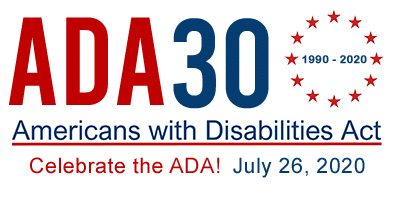
Great Reads!
- Honoring 30 Years of the ADA by the Campaign for Disability Employment (CDE). The blog highlights the importance of the ADA in making America more inclusive of individuals with disabilities in the workplace and in the community. It also features the CDE’s public service announcements, each exploring a different angle of disability employment.
- The Americans with Disabilities Act (ADA) At 30 – A Piece of JAN History by the Job Accommodation Network (JAN).
- The Future of Work: Honoring the Americans with Disabilities Act by the Partnership on Employment & Accessible Technology (PEAT).
- The American with Disabilities Act Anniversary Commemorates 30 Years of Progress by the LEAD Center.
Great Events!
Disability History Virtual Tour at the Smithsonian
Thursday, July 23, 2020, from 12:00 p.m. – 1:30 p.m. EST
The U.S. Department of Defense’s Diversity Management Operations Center, Disability Programs Directorate, a partner in ODEP’s Workforce Recruitment Program, will host a virtual tour of the Smithsonian Institution’s disability history collection. During this celebration, Smithsonian historian Dr. Katherine Ott will show the National Museum of American History’s disability exhibit.
Register for the event and request accommodations by emailing dodhra.dmoc-dpd@mail.mil.
A Discussion on Youth Employment from the ADA Generation
Friday, July 24, 2020, from 1:00 p.m. – 2:00 p.m. EST
The young people with disabilities who came of age after the passage of this landmark legislation are often called the “ADA Generation.” During this webinar hosted by EARN, members of the ADA Generation will participate in a panel discussion about their workplace experiences and offer ideas for best practices employers can use to attract young people with disabilities.
Panelists will address topics such as policies and programs of particular interest to younger workers with disabilities, including internship, apprenticeship, and mentorship opportunities, and how to ensure these programs are accessible for everyone. They will also touch on how young people with disabilities view disability disclosure and self-identification. A representative from the Institute on Disability at the University of New Hampshire will also discuss key findings of the new Kessler Foundation survey on Experiences of the “ADA Generation” in the Workplace.
For a full list of events, see the ADA Anniversary Event page from the ADA National Network.
THIS COLUMN IS MEANT TO ASSIST IN A GENERAL UNDERSTANDING OF THE CURRENT LAW AND PRACTICE RELATING TO OFCCP. IT IS NOT TO BE REGARDED AS LEGAL ADVICE. COMPANIES OR INDIVIDUALS WITH PARTICULAR QUESTIONS SHOULD SEEK ADVICE OF COUNSEL.
SUBSCRIBE.
Compliance Alerts
Compliance Tips
Week In Review (WIR)
Subscribe to receive alerts, news and updates on all things related to OFCCP compliance as it applies to federal contractors.
OFCCP Compliance Text Alerts
Get OFCCP compliance alerts on your cell phone. Text the word compliance to 55678 and confirm your subscription. Provider message and data rates may apply.
